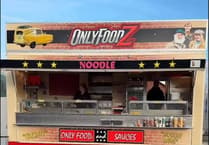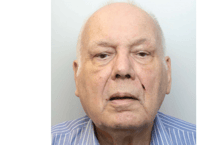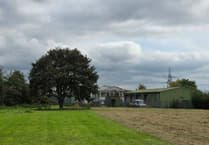AT 100 Fred Cooper is old enough to remember the first car at Berry Hill and the first aeroplane to fly over it – and a good deal more in a hard life though hard times.
"There were 14 of us, seven boys and seven girls," he said of the little cottages his family lived in at Bicknor Street, by the Dog and Muffler.
His playground was a forest of rough unmetalled roads and, locally, gorse-covered heath where later, during the bitter 1920s mining strike, he and fellow miners created Berry Hill's rugby ground largely by hand.
He had gone to work in the mine for 10 old pence (around 4p) an hour, walking all the way to Cannop and then down to the coal face in atrocious conditions, sometimes up to his knees in water.
If you didn't show up you weren't paid, if you arrived late at the face – which was when paid time started – you were sent home.
"We had to wade through it all, and haul the drams (carts) back through it," he said.
Ponies were also used in this work and he well remembers one – Buckler was a horse that could count!
"She would pull up to seven drams at a time all through the day – but no more. When it came to the end of the shift and the miners had a dram of their own coal (one of the mine perks) added to the seven she stopped and kicked back with her shins on the hitch, refusing the extra one."
They kept a pig and Fred had sheep of his own, and a dog which he could send on its own down the valley, up the other side and into the farmland of Tom Worgan where it could cut his sheep out of the flock and bring them all the way home again.
"I once had this ewe come up to me and she kept going round and round me and seemed to be trying to lead me away. In the end I followed and she led me right up on some rough ground where there were mine workings and big sloping gashes in the ground.
"She led me up to one and I looked in and saw her lamb had fallen in and was wedged. I laid down and reached in and I found I could just get a pinch of skin and pull it out.
"When I gave it back she took it off and kept looking over her shoulder and baaing back at me like saying thanks," he said.
And it was on one of Tom Worgan's farm carts that he nearly came to grief – the horse ran it off the road and fell back on him, pinning one hand under the trace fittings and crushing his leg.
Fred was "rushed" all the way to hospital in Monmouth, over bumpy road, in Tom Worgan's pony and trap.
"Dad walked by the side. I was in there for about eight weeks," he said.
Fred – who is related through an aunt to Denis Potter – speaks with great affection of his life in the Forest, where his family moved to pub lodgings in later years. They weren't angels.
"One day there was this man in the pub who kept sniffing and saying he wanted to end his life, cut his throat," said Fred.
"I said to my mate, 'come on, let's help him', and he held his head while I just cut a bit of skin off," he said. Apparently that was enough to cure suicidal tendencies!
The bare knuckle fighting came with visiting fairs – and well able to look after himself, Fred put up a good performance or two in the 'have a go' boxing booths.
His other passion is rugby, and he remains the oldest living captain of Berry Hill where he is proud to have given the initial push.
The general strike forced him to go to Evesham in search of work but he was able to return to the Forest where his son, now living in Birmingham, bought a house in Coleford.
Fred now lives in comfortable surroundings at the Priory private nursing home in Llandogo, where he can look out over the Wye Valley to his beloved Forest, and where on Sunday there will be a big party with relatives to celebrate his milestone birthday.
Asked if he thinks such a hard life has done him much harm, he just chuckles and shakes his head.




